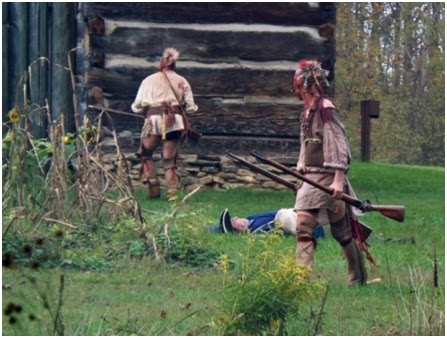It’s 7:45am on a Wednesday morning, and here I am trying to write a blog. I should write about some important issue or analyze the significance of the book we’re reading in class, Storming Heaven by Denise Giardina, which is based on the coal wars of Appalachia. Frankly, my teacher is lucky I’m even sitting up in my seat instead of slouched over my desk, drooling on the computer. Since my brain refuses to kick into gear, I’m going to rely on my instincts as a writer and discuss the book from that standpoint.
As a class, we read another of Giardina’s pieces. It was a short memoir-esque look at Appalachia called “Appalachian Images: A Personal History” from the anthology Back Talk from Appalachia: Confronting Stereotypes. She discussed many of the same themes that occur in her novel, but she also reflected upon an old family photograph from when her grandmother was still a girl. She named all the people in the photograph. Her grandmother Flora, Flora’s brothers William Harrison, Andy, Alec, Miles, and Jesse; Flora’s sister Tabitha, and their parents Orlendo and Mary. Giardina went on to say that William Harrison died in a logging accident not long after this photo was taken.
We were discussing “Appalachian Images” in relation to the novel Storming Heaven when one girl exclaimed, “Hey, she [Giardina] cheated! She used names from real life for her characters!” Not only that, but the logging accident that killed William Harrison in real life killed the character Orlendo in the book. I wanted to turn around and tell this girl what seasoned writers had spent two and half weeks over the summer telling me: “Write what’s at the end of your nose.” Because when you write what you know, what you see and hear and feel, it makes the writing better. The story comes to life with details and characters so real, the reader can’t help but actually experience it all – because these things actually existed. It’s not cheating; it’s a basic writing skill.
So there’s one writer-ly comment. Here’s another: the intricacy of the relationships among the characters in her novel is astounding. Each chapter is in first person point of view of a specified character. The first part of the four part book introduces each character and a little bit of their story. As the book continues, the characters start to mix and we see how the lives of the characters interact and affect each other. It’s like the movie Six Degrees of Separation. As a writer, I greatly admire her ability to show the subtle complexities of human interaction.
Speaking of the characters, I love them all – borrowed from the real world or not. I love them even when they are royally ticking me off (*cough*Rondal*cough*). Each is relatable in their own special way. I adore Carrie for her stubborn pride and deep-seated need to help others. (And possibly because she was a love-sick teenager around my own age and therefore extremely relatable.) Even though I am currently upset with Rondal, in my heart I still have a nagging affection for his determination to bring a better life to other miners – a life he, his brothers, and his father never received. I love CJ because he makes me think. He has such a unique view on world issues. Then there is Rosa. I haven’t come to love her yet, but I have an abundance of sympathy for the Italian immigrant forced to move to the Appalachian coal fields by her callous husband. My love for these characters is a huge reason that I’m absolutely devouring this book.
Perhaps, though, Giardina’s potent mix of history and fiction is the most powerful aspect of Storming Heaven. This subject resonates with me because I am a native West Virginian – a born-and-bred Appalachian. This is my history. The way Giardina tells it, though, it resonates with anyone. The characters wiggle their way into the reader’s heart, and as he/she comes to love them and the places they live, the reader starts to care about the issues of the book. I didn’t live in the time when the Baldwin-Felts agents were shadily buying up all the land and abusing the miners who worked on it, but I feel indignation anyway. I want to throw some rocks through the windows of mine-owners’ Boston homes. It won’t make a difference, though, because that era has already passed. The fact that I want to, however, is a testament to Giardina’s skill as a writer.
The compelling blend of incredible details, lovable characters, and a fascinating historical era make this book the masterpiece that it is. As a writer, I am in awe of Giardina’s talent for writing, and as a reader all I can say is “Yay! I’m almost done!” and then here all too soon, “Well, crap, now it’s over.”
-J














